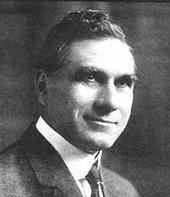Author, F.F. Bosworth: The Man Behind Christ the Healer
Copyright © 2018
#FFBosworth
#BosworthMatters
#BosworthMention
 |
| John G. Lake |
F.F. Bosworth is mentioned in a paper that presents a scathing analysis of John G. Lake. The paper is titled "John G. Lake’s Formative Years, 1870-1908: The Making of A Con Man.” It is written by Barry Morton. The paper, in no uncertain terms, presents a highly negative evaluation of Lake. Morton unleashes a blistering critique, arguing that Lake and some of his biographers have misled readers about his life history. Lake was known for his work in South Africa, but the paper focuses on his early years, before he moved overseas. It is an attempt by Morton to set the record straight regarding the many claims made by and about Lake. His analysis of Lake's "formative years" is unsparing. He writes:
John G Lake, like his mentor
John Alexander Dowie, was a master of both the big and small lie. His fairly
extensive catalog of writings, most of it generated after his return to America
in 1913, is a collection of banal religious dogma interspersed with as great a
deliberate set of falsehoods as one could ever hope to find in writing. One
turn-of-the-century debunker of John Alexander Dowie referred to the latter’s
writings as “serial fiction.” The same could be said of practically anything
written or preached by John G Lake. Additionally, faith healing
disciples of Lake’s such as Gordon Lindsay and Wilford Reidt produced
biographies of Lake that either perpetuated his old lies or produced new ones.
These dubious writings have generally not been critically examined by religious
scholars. Kent Burpeau, for instance, did not cotton on to Lake’s basic con in
his recent, sympathetic biography.
Morton is a research fellow
in the Department of History at the University of South Africa. He does not
believe in divine healing or miraculous healings as preached by Lake. He does,
however, believe “faith healing can cure psychosomatic diseases.” Morton’s
belief is in science. Again, he writes:
This paper is not a labor of
love. Rather, it is a much-needed corrective to a host of misleading
writings that many other faith healing con men have invoked in order to
increase the charismatic nature of their healing ceremonies. Despite centuries
of scientific studies showing that faith healing and prayer cannot cure any
organic disease or condition, many
people obviously seek out these quacks for treatment.
The reality is that faith
healers only trumpet invented successes and never mention the disastrous
failures that attend their work. Faith healing can cure psychosomatic diseases
such as depression and anxiety, given the right circumstances that faith healers
train themselves to create. The danger for the cured is that they
will be pressured to become members of the faith healer’s cult and subject to
intense exploitation thereafter. If my efforts in researching Lake’s past can
convince a single person to avoid seeking out a faith healing cure, then I
would consider them worthwhile.
Morton’s paper can be read
here.
F.F. Bosworth is mentioned
several times in the paper. Morton describes him as a close friend of Lake. He
also notes the sentiments of Bosworth during the fall of John Alexander Dowie.
As a young man, Bosworth and his family lived in Zion City, Ill., the town
founded by Dowie. Bosworth played in Dowie’s band.
On page 20, Morton refers to Bosworth as one of the “Parhamites”
who followed the teachings of Charles Parham. In the footnote, Morton calls
Bosworth “another Dowieite” who would later become a faith healer. Morton
writes:
Between late 1906 and 1907 Lake
was associated with, and came to co-lead, the Pentecostal “Parhamite” sect in
Zion. Because of the dramatic and lurid events that occurred there, Lake and
other Parhamites such as F.F. Bosworth did their best thereafter to minimize
any knowledge of their involvement with it.
On page 22, Morton notes Bosworth’s reaction to the Dowie
controversy:
To say that Dowie’s followers
were discouraged would be an understatement. Lake’s close friend, F.F.
Bosworth, noted in the lugubrious language of Pentecostalism, “the time was at
hand, when, as a Christian he was to wake up to the utter falsity of the claims
which were even then developing in the mind and purpose of the mistaken, tho
really great leader of Zion City, and to decline to have further association
with so misguided a man.”
Morton’s tone is not unlike
that of Hank Hannegraff and John MacArthur.
Pentecostal admirers of Lake will
find much with which to disagree. Still, as a critical work on Lake, his
research should be seen as a useful addition to the field of church history.
For a critique of Morton’s research on Lake, see 'John
G. Lake as a fraud, con man and false prophet': critical assessment of a
historical evaluation of Lake's ministry by Marius Nel (nel.marius1@gmail.com), who works in the Research
Unit of the Faculty of Theology North-West University. Nel’s paper, which refutes many of Morton's claims, can be read
here.
-----------------------------------------------------------------------------
Would you like to know more
about F.F. Bosworth?
Follow the Bosworth Matters blog!
You can start
right here.
-----------------------------------------------------------------------------
For more information:
Visit ffbosworth.strikingly.com. The Bosworth page is here. Questions about the research and commentary on F.F. Bosworth may be directed to Roscoe Barnes III, Ph.D., via email at doctorbarnes3@gmail.com or roscoebarnes3@yahoo.com. For updates on F.F. Bosworth history, simply follow this blog or @Roscoebarnes3 on Twitter. #ChristTheHealer

No comments:
Post a Comment